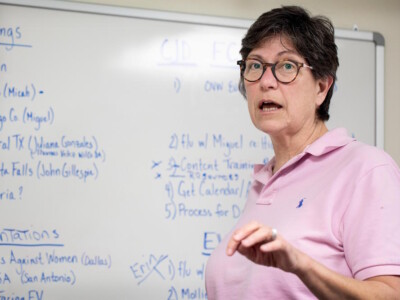Cameron County assistant district attorney Jason Campo was confident he would win the domestic violence case against a man who had admitted to physically harming the victim.
In addition to the man’s confession, a female juror had revealed she was a survivor of domestic violence during the trial. Since the defense attorney had used all of his preemptory challenges, or opportunities to dismiss a juror based on cause, the judge allowed the woman to stay on the jury. Campo was sure the juror would help ensure a felony charge for the defendant.
To his surprise, the jury returned a “not guilty” verdict.
“It turns out the woman tanked the case because, as a survivor, she downplayed the severity of the victim’s experience and compared it to her own abuse,” said Cynthia Jones, a philosophy professor at the The University of Texas Rio Grande Valley. “The survivor convinced the other jurors that the plaintiff’s experience wasn’t really that bad.”
Jones heard Campo share this courtroom experience last July, during an Expert Witness Program training conducted in Cameron County by the Steve Hicks School of Social Work’s Institute on Domestic Violence & Sexual Assault (IDVSA). The program is designed to improve prosecutorial responses to domestic violence, sexual assault and stalking crimes by building capacity for the criminal justice system to utilize expert testimony about the dynamics of these crimes. The training is based on research that shows that the use of expert witnesses in the prosecution of interpersonal crimes can improve the criminal justice system’s understanding of these crimes
“One of the perks of being an expert witness is being able to raise awareness of the fact that any level of violence is unacceptable,” said Jones, who personally identifies as a survivor of domestic abuse.
Jones and Campo were motivated to coordinate the IDVSA training in Cameron County, which sits on the border with Mexico, to help dispel misconceptions about domestic violence and sexual assault in the area. Jones said that many county residents are not aware of the prevalence of this kind of abuse, and they may be skeptical to believe the severity of a victim’s experience if the victim returns to the abuser or decides to drop charges.
In addition, the region’s legal system has stabilized after a slew of corruption charges against legal figures in 2014, and both Cameron County and neighboring Hidalgo County have good district attorneys, said Jones. She now takes any opportunity to share her knowledge with the district attorney’s office by using skills learned from the Expert Witness Program training.
“I’ve been able to give in-depth reasons why victims and survivors will go back to their abuser and choose to stay with them and drop charges,” Jones said. “I would like to think that what I’ve explained has helped the assistant district attorneys in these offices understand the complexity of these situations.”
The challenge is that there is a lack of knowledge regarding the dynamics of these crimes, and misinformation held by the general public as well as by the professionals who work in the court system, said Margaret Bassett, the director of the Expert Witness Program at IDVSA.
“Expert witnesses help by providing evidence-based information regarding the dynamics of these crimes to help improve the justice systems response to these crimes,” Bassett said. “Through their education, training or experience, experts are able to provide context for behavior that might not otherwise make sense.”
The program, which began in 2004, provides participants with education, information and opportunities to understand the specific roles of expert witness and attorney, and how an expert can ethically help educate the justice system.
Bassett said that to her knowledge there are no similar training programs existing anywhere else in the country. There are webinars available online, but the IDVSA model is unique in that it brings together experts and attorneys to increase knowledge and understanding, and practice case consultation and testifying.
“We’re helping to meet a need that wouldn’t be met otherwise,” Bassett said. “And through this grant, we now have the ability to attend a select number of actual trials to observe the testimony of our participants and provide feedback, so that they can improve for future trials.”
Jones said she has been summoned many times but she has yet to testify because the cases she was called for were delayed, settled out of court, or discharged. Regardless, she still provides consultations to the district attorney’s office how to move their cases forward.
“I also have been able to share information that helps them address cases empathetically, especially when they have a victim that is reluctant to move forward with pressing charges,” Jones said.
She said that it’s particularly crucial for expert witnesses to work with district attorneys in areas along the border because she has seen cases where abusers have exploited a partner’s immigration status to keep them in a dangerous relationship.
“There’s a lot of extra levels of fear involved when this happens, and it’s something used in the border region to keep victims from talking. ” Jones said. “Even if the victim is in the country legally, sometimes other family members might not be. Perpetrators prey upon people’s weaknesses, especially when there’s children involved and fear of deportations.”
As far as the legal system goes, it’s hard to help victims even if they have obtained legal immigration status because of the fear and marginalization that exist on the border region, she said.
This is why she’s working with IDVSA to coordinate another summer training later this year in Hidalgo County.
“I’m hoping that more of these expert witness trainings with IDVSA should be empowering,” Jones said. “You empower victims by empowering the advocates and district attorneys to prosecute these kinds of crimes.”
By Lynda Gonzalez. Published March 13, 2019. Edited march 18, 2019.


